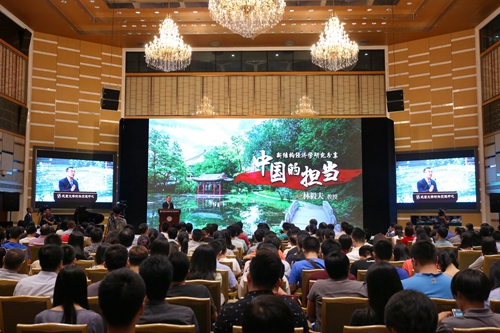Peking University, September 21, 2017:
On the evening of September 19, “Leading the Future: Honoring Traditions and Pioneering Innovations”-A Special Talk of National School of Development (NSD), in celebration of the 120th anniversary of PKU, was held in the Sunshine Hall of Yingjie Overseas Exchange Center. Yao Yang, Justin Yifu Lin, Chen Chunhua, and representatives of students gave talks on the changes NSD has undergone and the prospects of Chinese economy. Professor Huang Yiping acted as the host.
Hao Ping
The talk kicked off with the poetry recital “My South and North”. After the warming video “Merit the Time as well as you”, PKU Council Chairman Hao Ping gave his opening speech. First, he acknowledged the achievements that NSD had attained in recent years, and then pointed out the common mission undertaken by NSD faculties and students as well as all PKUers.
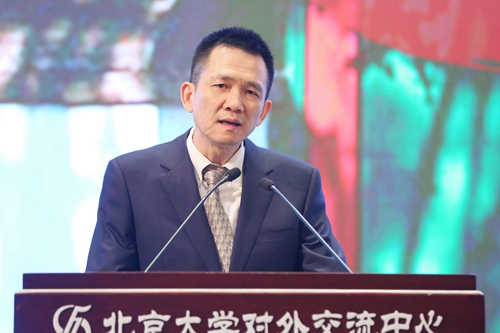 Yao Yang
Yao Yang
President of NSD Yao Yang talked about “the Pattern and Future of NSD”. After retrospecting the history of NSD, its academic settings, and research achievements, he introduced NSD’s spirits: open-mindedness, rigorous academic attitude, and being positively involved in Chinese historical course. Professor Yao unfolded NSD’s goal of development: to become a comprehensive school studying national development with its focus on economics, and to contribute to PKU ranking among world-class universities.
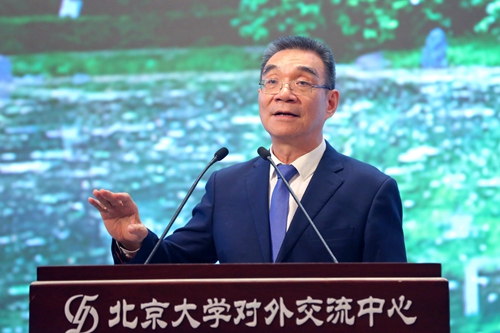 Justin YIfu Lin
Justin YIfu Lin
Justin Yifu Lin, honorary president of NSD and director of the new structural economics research center, gave his keynote speech entitled “China’s responsibility: Researches on New Structural Economics”.
Lin first reviewed the evolution on new structural economics. Adam Smith’s The Wealth of Nations published in 1776 laid the foundation of modern economics; after WWⅡ, to meet the needs of industrialization and modernization, development economics became independent of modern economics as many developing countries broke the rein of colonial rules. Since then, there have been three major academic trends in development economics: structural economics, Neo-liberal economics, and new structural economics. The first two trends, unfortunately, conduced little to the prosperity of most developing countries. The theory of new structural economics advocates applying neoclassical methods to the study of structural transitions in economic progress, and regards the essence of modern economic growth as the process where technology, industry, infrastructure, and institutional structure constantly change; thus developing countries have to choose appropriate industrial technology based on their own relevant advantages decided by factor endowments, whereby they can form competitive advantages, create maximum surplus value, attain capital accumulation and achieve industrial upgrading. “If so, every developing country can grasp the opportunity and sustain stable and rapid economic development just as China.” Thought Justin, the theory of new structural economics can truly help developing countries realize their pursuits, viz. the revival of the nation and the happiness of the people.
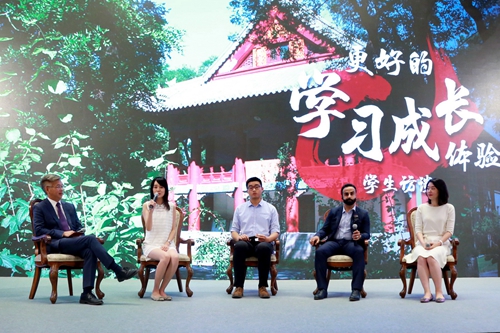 Students' Dialogue
Students' Dialogue
In the following part of the student dialogue, NSD’s representative of undergraduates Deng Hongyi, NSD’s representative of guaduates Liang Fang, a student representative from South-South Institute Nasser Alshaqsi, and the representative member of EMBA Du Lei, shared with the audience their special feelings and experiences while studying in NSD.
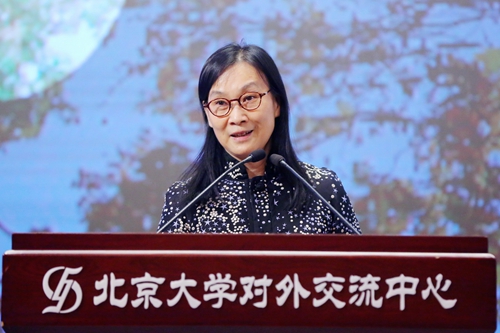 Chen Chunhua
Chen Chunhua
Dean of BiMBA Chen Chunhua delivered her speech “Hands Higher than Head: Action is More Important than Mission.” Tracing the development of management discipline, she pointed out that besides grasping the research methods and scientificity, the sensitivity to theory and the capacity to combine theory with practice are also prerequisites to achieving excellence in management studies. Chen used to pick 25 domestic and international enterprises to carry out sample studies, trying to explore the development model and continuous mechanism of Chinese enterprises. Executing management practices that accord with Chinese ideas and western methods, promoting channel drive, and constructing the community of interests in tune with social development, serving as leaders in the industry are all key elements for an enterprise to succeed. The customers-first principle, self-driven system, competitive learning, and all-involvement innovation serve as the recipe for continual development.
“The power of knowledge extends beyond your imagination.” According to Chen, “Since the 20th century, knowledge has been authentically melted into the waves of revolution.” Therefore, she encouraged students to focus on knowledge and its comprehensive employment with the conviction of life-long learning. So she concluded: hands are higher than heads, and only by incessantly releasing the potential of knowledge and insect action between ideal and reality can we realize our dreams.
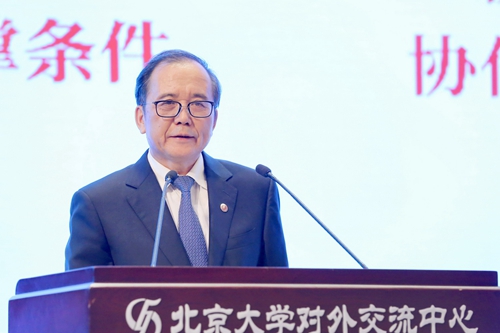 Lin Jianhua
Lin Jianhua
At last, PKU President Lin Jianhua gave the keynote speech “Where does excellent learning come from?” In the speech, Lin stated that scholars and ambience rank first in significance for superb academic institutions. In addition to the compliments granted to NSD for its nice academic ambience and positive spiritual outlook, Lin, at the same time, looked forward to more remarkable academic institutions burgeoning in PKU.
Written by:
Wei Yunqi
Edited by:
Yan Shengnan

